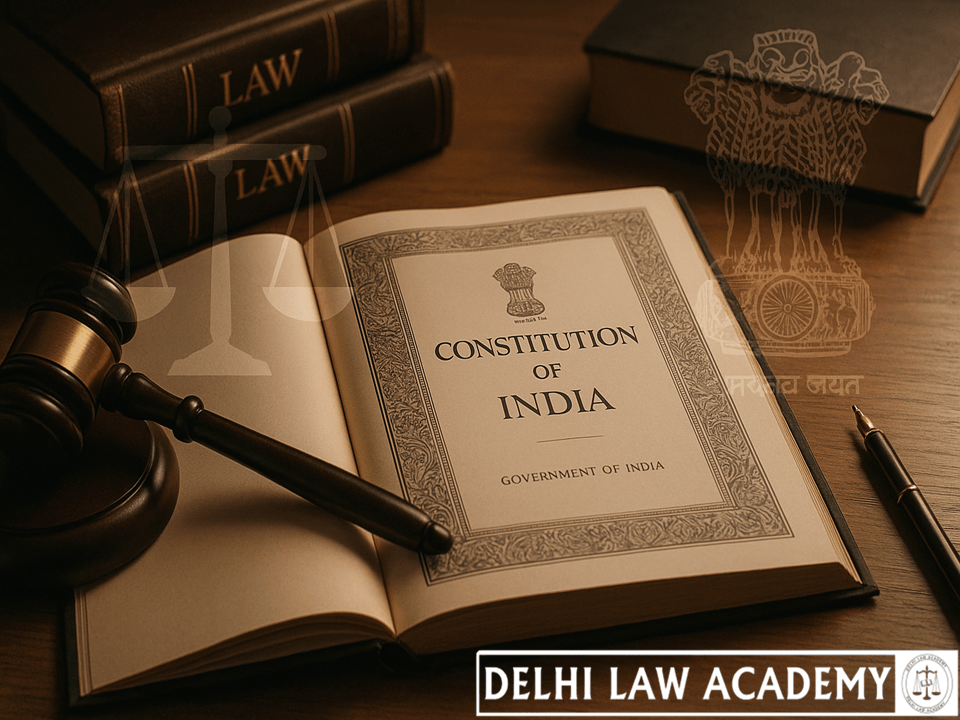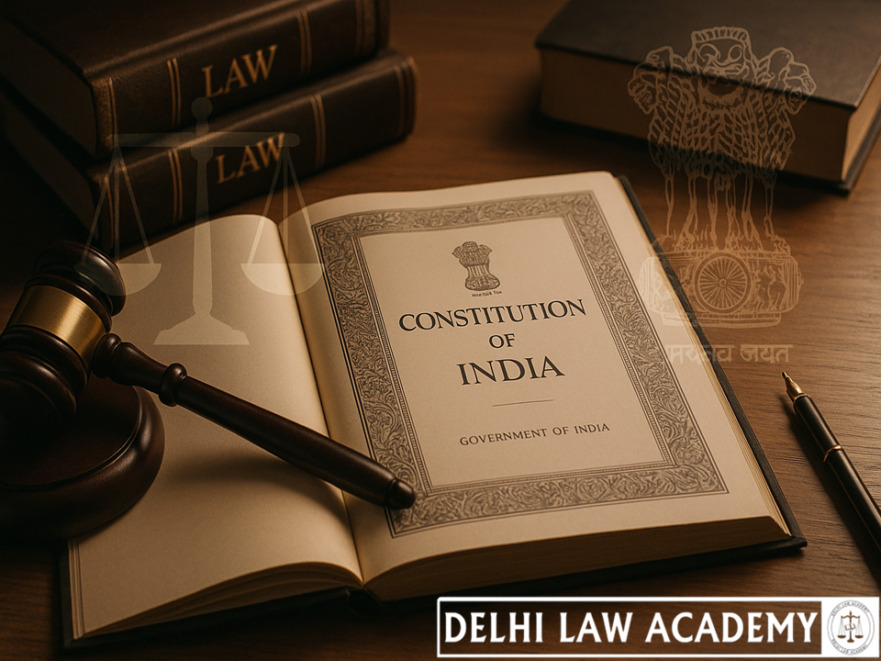
⚖️ Union Judiciary – Articles 124 & 124A & 99th Constitutional Amendment
Delhi Law Academy Jaipur | Notes for RJS, DJS & PCS(J) Judiciary Aspirants
📘 Articles 124 and 124A of the Constitution of India
99th Constitutional Amendment, 2014
Delhi Law Academy Jaipur presents below for aspirants of RJS, DJS, PCS(J) and other Judicial Services throughout India a simplified Note on the Constitutional provisions relating to constitution and functioning of UNION JUDICIARY.
📜 Supreme Court Advocates-on-Record Association v. Union of India
- Clauses (a) and (b) of Article 124A (1) do not provide an adequate representation to the judicial component in the NJAC. The same are accordingly, violative of the principle of “independence of the judiciary”.
- Clause (c) of Article 124A (1), in my view, impinges upon the principles of “independence of the judiciary”, as well as, “separation of powers”.
- Clause (d) of Article 124A (1) which provides for the inclusion of two “eminent persons” as Members of the NJAC is ultra vires the provisions of the Constitution, for a variety of reasons.
🏛️ Constitutional Provision
Supreme Court — Article 124(1)
- Supreme Court of India consists of Chief Justice of India and not more than 7 other judges.
- Parliament may by law prescribe a larger number of judges.
📖 Article 124A
- Article 124A (1) provided for the constitution and the composition of the National Judicial Appointments Commission (NJAC).
- It is composed of the following:
- (a) Chief Justice of India — Chairperson, ex officio
- (b) Two other senior Judges of Supreme Court, next to the Chief Justice of India — Members, ex officio
- (c) Union Minister in charge of Law and Justice — Member, ex officio
- (d) Two eminent persons, to be nominated — Members
⚖️ Constitution v. Supreme Court
Supreme Court Advocates-on-Record Association v. Union of India (16 October 2015)
- If the inclusion of anyone of the Members of the NJAC is held to be unconstitutional, Article 124A will be rendered nugatory, in its entirety.
- Clauses (a) and (b) of Article 124A (1) do not provide an adequate representation to the judicial component in the NJAC.
- Clauses (a) and (b) of Article 124A(1) are insufficient to preserve the primacy of the judiciary in the matter of selection and appointment of Judges to the higher judiciary (as also transfer of Chief Justices and Judges from one High Court to another).
- Clause (c) of Article 124A (1) is ultra vires the provisions of the Constitution because of the inclusion of the Union Minister in charge of Law and Justice as an ex officio Member of the NJAC.
- Clause (c) impinges upon the principles of “independence of the judiciary” and “separation of powers”.
- Clause (d) providing for two “eminent persons” in NJAC is unconstitutional and violates the basic structure of the Constitution.
- Hence, all the clauses (a) to (d) of Article 124A (1) were struck down, rendering the 99th Constitutional Amendment Act, 2014 unconstitutional.
⚖️ Independence of Judiciary
- The concept of “independence of the judiciary” emerges from a collective reading of Articles 12, 36 and 50.
- It is sometimes not possible to deduce the “basic structure” from a plain reading of the Constitution; at times, it is derived from the silences within the Articles.
🧾 Current Legal Status of NJAC
- The 99th Amendment Act and the NJAC Act 2014 have been held unconstitutional by the Supreme Court in its landmark judgment dated 16.10.2015.
- Appointment of Judges to the Supreme Court shall now be governed by the original provisions as interpreted by the Supreme Court in 1993.
🌐 Transparency in Collegium
- On Oct 6, 2017, the Supreme Court collegium said it would upload its decisions on appointment and transfer of judges of the apex court and High Courts on the Supreme Court’s website.
- These details would be available as collegium resolutions — the first major step towards transparency.
- “Decisions henceforth taken by the collegium indicating the reasons shall be put on the website of the Supreme Court when recommendations are sent to the Government of India.”
📘 Other Provisions of Article 124
- An SC judge holds office till the age of 65 years.
- He may be removed in the manner prescribed in clause (4).
- Age of a SC judge shall be determined by an authority constituted by Parliament by law.
📜 Article 124(3) — Qualifications
- He should be a citizen of India.
- He should have been a judge of a High Court for at least 5 years, or
- He should have been an advocate of a High Court for at least 10 years, or
- He is a distinguished jurist in the opinion of the President.
📚 For more Constitution & Polity Notes, visit
Delhi Law Academy Jaipur
📘 Stay Ahead with Delhi Law Academy!
Get access to free monthly current affairs, read our insightful blogs,
and explore free study resources prepared by experts at DLA Jaipur. 🚀
❓ Frequently Asked Questions on Union Judiciary, Article 124 & NJAC
⚖️ What does Article 124 of the Indian Constitution deal with?+
Article 124 establishes the Supreme Court of India. It defines its composition, appointment of judges, qualifications, tenure, and procedures. It also lays the constitutional foundation for the independence of the judiciary and separation of powers.
👩⚖️ What is Article 124A and how did it create the NJAC?+
Article 124A, inserted by the 99th Constitutional Amendment, established the National Judicial Appointments Commission (NJAC). It included the Chief Justice of India, two senior Supreme Court judges, the Law Minister, and two eminent persons to recommend appointments to higher judiciary. It aimed to replace the Collegium system.
🚫 Why was the NJAC declared unconstitutional by the Supreme Court?+
In 2015, the Supreme Court struck down the 99th Amendment and the NJAC Act, holding that they violated the basic structure of the Constitution. The inclusion of executive and non-judicial members undermined judicial independence and separation of powers.
📚 What is the difference between the Collegium System and NJAC?+
The Collegium System, evolved from the Second and Third Judges’ Cases, gives the Chief Justice of India and senior judges primacy in appointing judges to higher courts. The NJAC, on the other hand, sought to include executive and lay representation, which the Court found unconstitutional for compromising judicial independence.
🔍 What does “independence of judiciary” mean under Articles 12, 36 and 50?+
“Independence of the judiciary” means that judges must be free from executive or legislative control in their functioning, decisions, and tenure. It arises from a collective interpretation of Articles 12, 36, and 50, ensuring separation of powers as a core feature of the Constitution’s basic structure.
🌐 What steps has the Supreme Court taken to make the Collegium process more transparent?+
In October 2017, the Supreme Court Collegium began publishing its decisions and reasons for appointments and transfers on the Supreme Court’s official website. These are available as collegium resolutions — a major step toward transparency and accountability in judicial appointments.
Contact us
📍 Delhi Law Academy – Jaipur Branch
6C, Tower 2, Coaching Hub, Pratap Nagar, Jaipur – 302033
📞 Phone:
+91 9911916552
+91 8447285606
✉️ Email:
contactus@delhilawacademy.com

